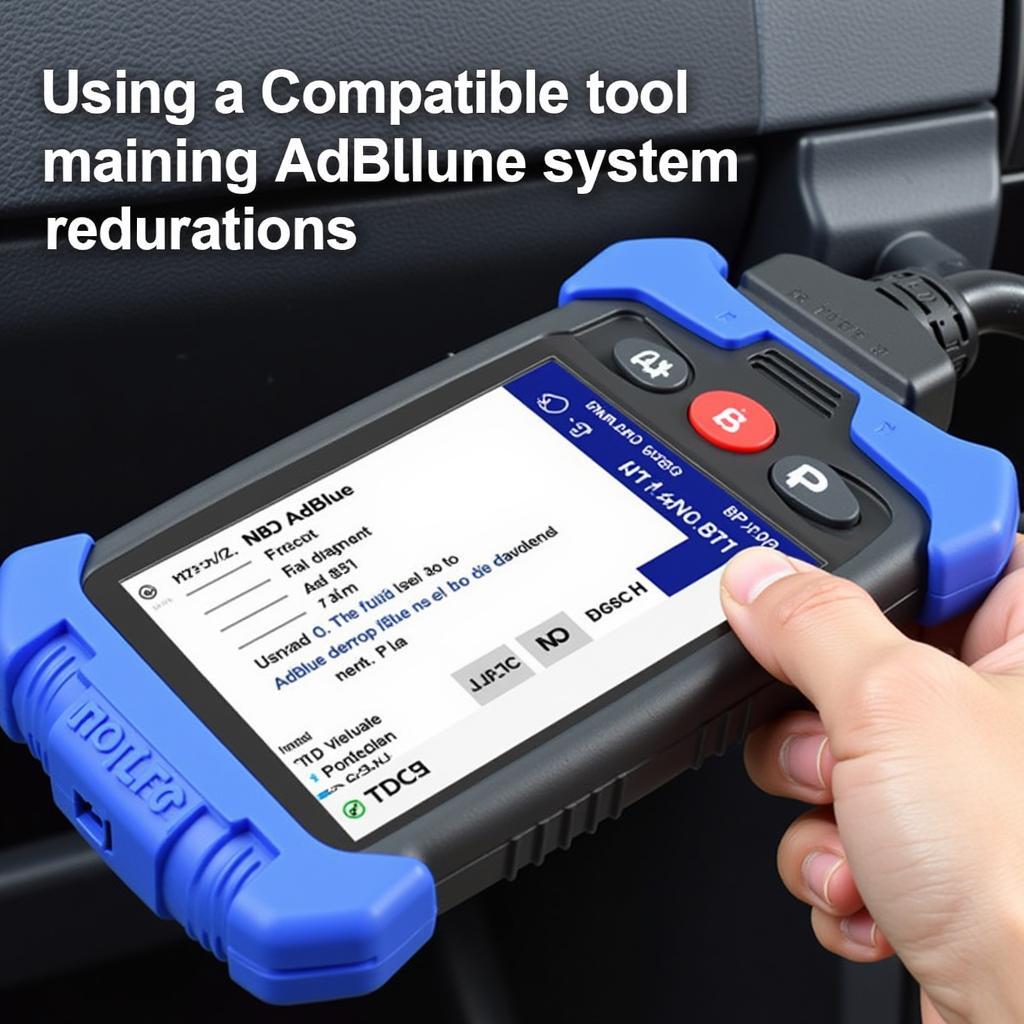Modern diesel vehicles rely on AdBlue systems to reduce harmful emissions. Understanding how these systems work and, more importantly, how to diagnose them when problems arise, requires the right diagnostic tool for car with AdBlue system. Choosing the correct tool can save you valuable time and money, whether you’re a professional mechanic or a DIY enthusiast.
What is AdBlue and Why is it Important?
AdBlue, also known as Diesel Exhaust Fluid (DEF), is a solution of urea and deionized water injected into the exhaust stream of diesel vehicles. This fluid triggers a chemical reaction within the Selective Catalytic Reduction (SCR) system, converting harmful nitrogen oxides (NOx) into harmless nitrogen and water vapor. This process is crucial for meeting stringent emission standards. A malfunctioning AdBlue system can not only lead to increased emissions but also trigger warning lights, reduced engine performance, and even prevent the vehicle from starting.
Choosing the Right Diagnostic Tool for Car with AdBlue System
Selecting the right diagnostic tool is paramount for effectively troubleshooting AdBlue system issues. Several factors influence this decision, including the vehicle’s make and model, the complexity of the system, and the user’s technical expertise. Basic code readers can retrieve generic fault codes, but they often lack the depth needed for comprehensive diagnostics. More advanced tools, often used by professional mechanics, offer features like live data streaming, component actuation, and guided troubleshooting procedures.
Key Features to Consider
- Compatibility: Ensure the tool supports your specific vehicle’s make, model, and year. Some tools specialize in certain manufacturers, while others offer broader coverage.
- AdBlue Specific Functions: The tool should be able to access and interpret AdBlue-related data, including fluid levels, sensor readings, and injector performance.
- Live Data Streaming: This feature allows you to monitor real-time data from various sensors, providing valuable insights into the system’s operation.
- Bi-Directional Control: With this capability, you can activate or deactivate specific components, such as the AdBlue injector, for testing purposes.
- Guided Troubleshooting: Some tools offer step-by-step instructions for diagnosing and resolving common AdBlue system problems.
- Update Frequency: Regular updates are essential to ensure compatibility with the latest vehicle models and software.
Common AdBlue System Problems and How a Diagnostic Tool Helps
Several issues can plague AdBlue systems, from simple sensor malfunctions to more complex problems within the SCR system. A diagnostic tool allows you to pinpoint the root cause quickly and efficiently.
- Low AdBlue Fluid Level: While this might seem obvious, a diagnostic tool can confirm the low fluid level and rule out other potential issues.
- Faulty NOx Sensors: These sensors monitor the levels of nitrogen oxides in the exhaust. A diagnostic tool can identify faulty sensors and pinpoint their location.
- AdBlue Injector Problems: A clogged or malfunctioning injector can disrupt the AdBlue injection process. A diagnostic tool can test the injector’s performance and determine if replacement is necessary.
- SCR Catalyst Issues: Over time, the SCR catalyst can become contaminated or damaged, reducing its effectiveness. A diagnostic tool can help assess the catalyst’s performance.
DIY vs. Professional Diagnostics
While basic diagnostic tools can be helpful for DIY enthusiasts, complex AdBlue system issues often require the expertise of a qualified mechanic. Professional-grade diagnostic tools offer more advanced features and access to detailed technical information. Furthermore, mechanics have the experience and training to interpret the data and perform the necessary repairs safely and effectively.
“A quality diagnostic tool is an essential investment for any workshop dealing with modern diesel vehicles,” says John Miller, a seasoned automotive technician with over 20 years of experience. “It allows us to quickly diagnose AdBlue system problems and get our customers back on the road.”
Conclusion
Choosing the right diagnostic tool for car with AdBlue system is crucial for effective troubleshooting and repair. Whether you’re a professional mechanic or a DIYer, understanding the system’s complexities and investing in the appropriate diagnostic equipment will save you time and money in the long run. Remember to select a tool that is compatible with your specific vehicle, offers AdBlue-specific functions, and provides the level of detail you need for accurate diagnostics.
FAQ
-
What is the purpose of AdBlue?
AdBlue reduces harmful NOx emissions from diesel vehicles. -
Can I use any diagnostic tool for my AdBlue system?
No, the tool must be compatible with your vehicle’s make and model. -
What are some common AdBlue system problems?
Low fluid levels, faulty sensors, and injector problems are common. -
Can I fix AdBlue system problems myself?
Simple issues might be DIY-friendly, but complex problems often require professional help. -
How important are diagnostic tool updates?
Regular updates ensure compatibility with the latest vehicle models and software. -
Why is live data streaming important?
It allows real-time monitoring of sensor data for accurate diagnostics. -
What should I look for in a professional-grade tool?
Features like bi-directional control and guided troubleshooting are beneficial.
Other Common Situations
- AdBlue Warning Light: This indicates a problem with the AdBlue system, requiring diagnosis with a suitable tool.
- Limited Engine Performance: A malfunctioning AdBlue system can trigger limp mode, restricting engine power.
- Vehicle Won’t Start: In some cases, a severe AdBlue system failure can prevent the engine from starting.
Related Articles
- Understanding Your Car’s Emissions System
- Diesel Engine Maintenance Tips
- Choosing the Right OBD-II Scanner
For further assistance, please contact us via WhatsApp: +1(641)206-8880 or Email: [email protected]. Our customer support team is available 24/7.



